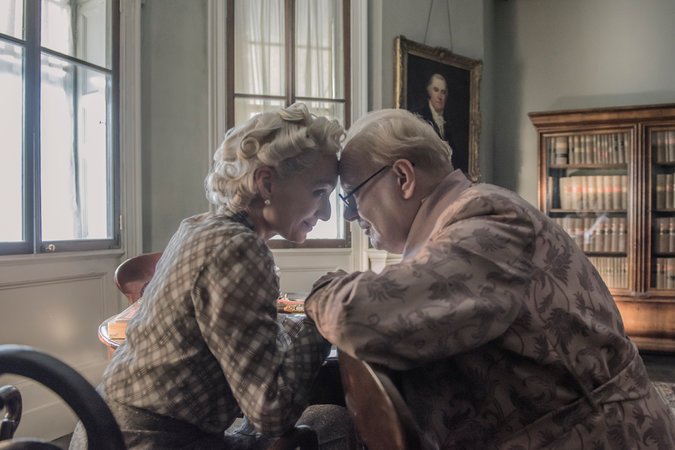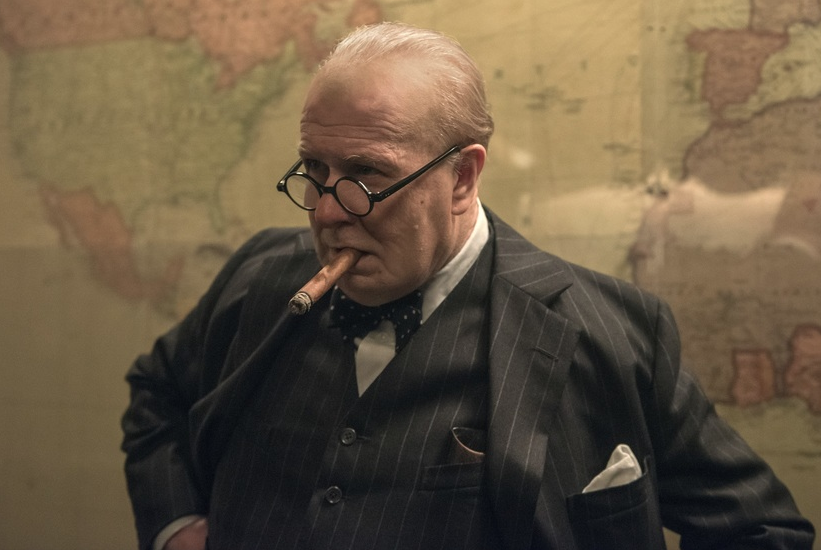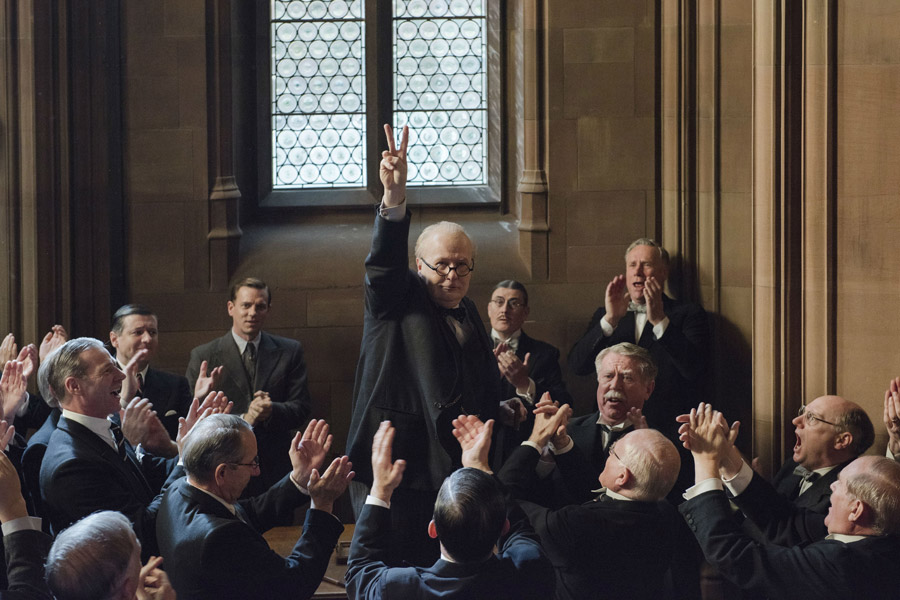Darkest Hour (2017)
CAST: Gary Oldman, Lily James, Kristin Scott Thomas, Ben Mendelsohn, Stephen Dillane, Ronald Pickup
REVIEW:
2017 has been a good year for the Dunkirk evacuation, a pivotal event in WWII but an incident which had previously received little Hollywood attention. Combined with Christopher Nolan’s “you are there” docudrama Dunkirk, which took us to the beaches, onboard the ships, and into the sky, and Lone Scherfig’s Their Finest, about a British propaganda film made about the event, Darkest Hour takes us to the vantage point of 10 Downing Street and centers around Winston Churchill himself. To this end, Darkest Hour features no real battle scenes—apart from fleeting glimpses—and its talky tone will limit its primary audience to history buffs, especially those with a particular interest in Churchill, but for those who consider themselves in that category, Darkest Hour is an engaging docudrama about the first two weeks in office of perhaps Britain’s most famous Prime Minister, and how he almost lost the position not long after he attained it.
It is May 1940, and with German forces rolling across Europe and the collapse of France and Belgium imminent, the British House of Commons moves for a vote of no confidence in the ineffectual leadership of Prime Minister Neville Chamberlain (Ronald Pickup). Chamberlain wants the position to pass to his political ally Viscount Halifax (Stephen Dillane), who shares his appeasement-minded policies and belief that the only way to save Britain is peace negotiations with Hitler. However, Halifax believes he cannot lead effectively without the support of the opposition party, and it falls to the unpopular, unpredictable, and controversial Winston Churchill (Gary Oldman) to take up the post, form a coalition government, and guide Britain through the troubled times. Churchill’s grasp on power is tenuous. His hard-line “no survival without victory” speech leaves his Parliament colleagues unimpressed at best, appalled at worst. King George VI (Ben Mendelsohn) prefers Halifax. 300,000 British troops have been pushed to the beach at Dunkirk, and Churchill’s answer—send the nearby garrison at Calais to the cavalry—is viewed as throwing away 4,000 men on a futile suicide mission. The American President Roosevelt refuses to break neutrality laws to supply Britain. Italy offers to mediate negotiations between Britain and Germany, and Halifax and Chamberlain conspire to force Churchill to accept this by threatening to jointly resign, which would force a vote of no confidence and remove Churchill from office mere days after he entered it.
Joe Wright (who previously touched on the Dunkirk evacuation in Atonement) directs the potentially dry, talky proceedings with visual flair that injects a needed dose of energy and urgency, superimposing the dates onscreen as the days tick by, occasionally giving fleeting glimpses of tides of refugees on war-torn French roads or, briefly, the bombing of the doomed Calais garrison (though war images are few and far between) and starting off with an overhead shot of the cavernous House of Commons, slowly panning down to the floor speaker. Period details and production values are impeccable, and there are effective character moments between Churchill and his devoted wife Clementine (Kristin Scott Thomas), whose support he depends on in his weaker moments, and in the shifting dynamic between Churchill and King George VI, who initially only grudgingly appoints him as Prime Minister but eventually becomes an ally and supporter. There’s also political intrigue—Halifax and Chamberlain’s machinations against Churchill—and tension over how long he’ll be able to hold on to his new power (though, of course, everyone knows he ultimately perseveres). With Hitler offscreen apart from a brief glimpse in a newsreel, we have Churchill’s political nemesis Halifax to provide us with a visible “antagonist”.
 When it comes to Churchill himself, it’s a warts-and-all portrayal. He is curmudgeonly and can be rough-tongued and abrasive—he sends his new personal secretary Elizabeth Layton (Lily James) running from the room near tears in their first encounter after a tongue-lashing—is prone to temperamental fits in war conferences, at times shows a hazy grasp of strategy and/or an unwillingness to face bitter truths (his first unrealistically optimistic military conference with the French does not inspire confidence), and is a heavy smoker and drinker and self-indulgent (he dictates speeches while lounging in bed or at one point even in the bathtub, sending Elizabeth scurrying for cover when he shamelessly emerges naked, and he declines meetings with the King in favor of the daily afternoon nap which he refused to give up under any circumstances). But he is also capable of moments of empathy—he is moved upon learning Elizabeth has lost a brother in action—and the same pugnacious stubbornness that could sometimes make him insufferable might have ended up being the same quality Britain needed to pull it through its darkest hour. While there’s no real war scenes—and this takes place before the destruction of the Blitz—Darkest Hour makes it clear how bleak Britain’s position seemed at the time. With France collapsing and the United States declining to interfere, Britain was left to stand alone against Nazi Germany, and the situation seems so hopeless that even the indomitable Churchill is plagued by doubts and verging on despair and brought to the brink of considering peace negotiations. Dunkirk is as much Churchill’s salvation as the British army’s; his Operation Dynamo mobilizing an impromptu fleet of civilian vessels to rescue the 300,000 stranded soldiers without sacrificing precious naval ships ensures the British army lives to fight another day, and inspires his rousing “we shall never surrender!” address to Parliament. Had Halifax succeeded in removing Churchill from office and throwing Britain on Hitler’s mercy, the war might have gone very differently. When it comes to the historical record, Darkest Hour is mostly accurate, although some elements—including Churchill’s wavering resolve and Halifax and Chamberlain’s plotting against him—are exaggerated for dramatic effect and Lily James’ Elizabeth Layton is a composite of various secretaries (albeit taking the real name of one of them) and there’s times when the emphasis placed on Layton feels a little superfluous and artificial. The biggest invention, a scene in which Churchill takes the subway for the first time and sounds out common citizens, is a bit cutesy and trite in the way it invents the moment that gave Winston his groove back and inspired his climactic speech.
When it comes to Churchill himself, it’s a warts-and-all portrayal. He is curmudgeonly and can be rough-tongued and abrasive—he sends his new personal secretary Elizabeth Layton (Lily James) running from the room near tears in their first encounter after a tongue-lashing—is prone to temperamental fits in war conferences, at times shows a hazy grasp of strategy and/or an unwillingness to face bitter truths (his first unrealistically optimistic military conference with the French does not inspire confidence), and is a heavy smoker and drinker and self-indulgent (he dictates speeches while lounging in bed or at one point even in the bathtub, sending Elizabeth scurrying for cover when he shamelessly emerges naked, and he declines meetings with the King in favor of the daily afternoon nap which he refused to give up under any circumstances). But he is also capable of moments of empathy—he is moved upon learning Elizabeth has lost a brother in action—and the same pugnacious stubbornness that could sometimes make him insufferable might have ended up being the same quality Britain needed to pull it through its darkest hour. While there’s no real war scenes—and this takes place before the destruction of the Blitz—Darkest Hour makes it clear how bleak Britain’s position seemed at the time. With France collapsing and the United States declining to interfere, Britain was left to stand alone against Nazi Germany, and the situation seems so hopeless that even the indomitable Churchill is plagued by doubts and verging on despair and brought to the brink of considering peace negotiations. Dunkirk is as much Churchill’s salvation as the British army’s; his Operation Dynamo mobilizing an impromptu fleet of civilian vessels to rescue the 300,000 stranded soldiers without sacrificing precious naval ships ensures the British army lives to fight another day, and inspires his rousing “we shall never surrender!” address to Parliament. Had Halifax succeeded in removing Churchill from office and throwing Britain on Hitler’s mercy, the war might have gone very differently. When it comes to the historical record, Darkest Hour is mostly accurate, although some elements—including Churchill’s wavering resolve and Halifax and Chamberlain’s plotting against him—are exaggerated for dramatic effect and Lily James’ Elizabeth Layton is a composite of various secretaries (albeit taking the real name of one of them) and there’s times when the emphasis placed on Layton feels a little superfluous and artificial. The biggest invention, a scene in which Churchill takes the subway for the first time and sounds out common citizens, is a bit cutesy and trite in the way it invents the moment that gave Winston his groove back and inspired his climactic speech.
 Winston Churchill has been portrayed onscreen by many actors, including but not limited to Richard Burton, Bob Hoskins, Albert Finney, Brendan Gleeson, Timothy Spall (in a smaller supporting role in The King’s Speech), and John Lithgow (an unconventional casting choice that ended up winning an Emmy on the BBC series The Crown). In fact, this isn’t even the only Churchill movie of 2017; the other is the simply-titled Churchill starring Brian Cox (which is set much later in the war). Gary Oldman’s version is among the best; admittedly the heavy makeup, prosthetics, and padding applied by the makeup department deserves some of the credit for winning half the battle of making Oldman look like Churchill, but with the combination of approximations of Churchill’s distinctive voice and speaking style (although his Churchill voice admittedly occasionally slips) and his bulldoggish stride, Oldman all but disappears into the role so that for two hours we’re watching Winston Churchill, not Gary Oldman as we know him. For an actor increasingly guilty of slumming and picking up lazy paychecks, Oldman seems fully invested in his role here, bringing a long-dead historical figure to flesh-and-blood three-dimensional life in all his foibles and virtues (the quality that makes the difference between merely imitating someone and embodying them). His climactic rousing “we shall never surrender” speech is a triumphant moment for both character and actor (it’s got “Oscar clip” written all over it). It remains to be seen if this performance will land Oldman an Oscar (he has only been nominated once previously, for 2011’s Tinker Tailor Soldier Spy) but it’s not surprising he’s being regarded as a front-runner; the role has all the hallmarks of Oscar recognition, a respected actor never before granted Oscar gold, in a chameleonic transformation into an iconic historical figure.
Winston Churchill has been portrayed onscreen by many actors, including but not limited to Richard Burton, Bob Hoskins, Albert Finney, Brendan Gleeson, Timothy Spall (in a smaller supporting role in The King’s Speech), and John Lithgow (an unconventional casting choice that ended up winning an Emmy on the BBC series The Crown). In fact, this isn’t even the only Churchill movie of 2017; the other is the simply-titled Churchill starring Brian Cox (which is set much later in the war). Gary Oldman’s version is among the best; admittedly the heavy makeup, prosthetics, and padding applied by the makeup department deserves some of the credit for winning half the battle of making Oldman look like Churchill, but with the combination of approximations of Churchill’s distinctive voice and speaking style (although his Churchill voice admittedly occasionally slips) and his bulldoggish stride, Oldman all but disappears into the role so that for two hours we’re watching Winston Churchill, not Gary Oldman as we know him. For an actor increasingly guilty of slumming and picking up lazy paychecks, Oldman seems fully invested in his role here, bringing a long-dead historical figure to flesh-and-blood three-dimensional life in all his foibles and virtues (the quality that makes the difference between merely imitating someone and embodying them). His climactic rousing “we shall never surrender” speech is a triumphant moment for both character and actor (it’s got “Oscar clip” written all over it). It remains to be seen if this performance will land Oldman an Oscar (he has only been nominated once previously, for 2011’s Tinker Tailor Soldier Spy) but it’s not surprising he’s being regarded as a front-runner; the role has all the hallmarks of Oscar recognition, a respected actor never before granted Oscar gold, in a chameleonic transformation into an iconic historical figure.
Obviously Darkest Hour will be viewed as Oldman’s acting showcase first and foremost, but he’s backed up by an impeccable supporting cast. Lily James is earnest and appealing as Churchill’s personal secretary Elizabeth Layton, even if the focus on her feels a little superfluous. Kristin Scott Thomas, as Churchill’s long-suffering but steadfastly loyal wife Clementine, is just as good as Vanessa Redgrave (opposite Albert Finney in The Gathering Storm) and Janet McTeer (opposite Brendan Gleeson in Into the Storm). Stephen Dillane, stick lodged firmly in rear, is the appeasement-minded Viscount Halifax, the most visible antagonist onhand (although he’s more misguided than villainous), and Ronald Pickup is the weary Neville “peace in our time” Chamberlain, in a role originally meant for the late John Hurt, who was too ill to accept it, a somewhat ironic bit of trivia considering that in the film Chamberlain is dying of cancer. And after getting typecast as a few unimpressive secondary villains in films like The Dark Knight Rises, Exodus: Gods and Kings, and Rogue One, Ben Mendelsohn finally shows some discernible acting range as the stuttering King George VI (whom Colin Firth won an Oscar for portraying in The King’s Speech). A frothy ham in his recent villainous roles, here he’s nicely low-key and restrained, and in fact he nails the monarch so well in voice, speaking style, and speech impediment (avoiding the pitfall of taking it overboard) that while his portrayal of “Bertie” doesn’t have a great deal of screentime and isn’t a central focus (and thus we don’t get to “know” him nearly as well as we did Colin Firth’s version), it’s one of Darkest Hour‘s small pleasures. The voice of the American President Roosevelt heard in one scene on a phone call is provided by David Strathairn.
Darkest Hour has niche appeal; it’ll be too dry and talky for those seeking more battle-oriented WWII dramas, but fans of the subject matter will appreciate its meticulous attention to detail and how it conveys how desperate Britain’s situation was even before the days of the Blitz, and how close both the country and Churchill himself came to downfall. Those qualities, and Gary Oldman’s performance, are enough to make Darkest Hour a worthy viewing experience for those whom the subject matter interests.
* * *
